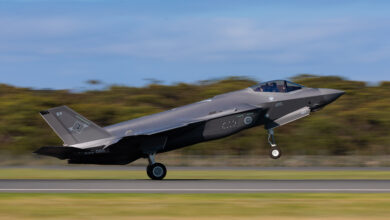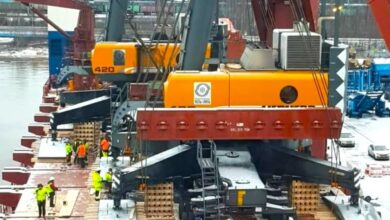Can the US use the F-35 to shoot down Turkey’s S-400 acquisition?
What are the consequences of the US leveraging the F-35 to pressure Turkey to abandon Russian air defense system plans and release an American pastor?
U.S. defense manufacturer Lockheed Martin held a ceremony with Turkish officials at its Texas plant in June, unveiling Turkey’s first two F-35 Joint Strike Fighter jets. But U.S. lawmakers are making an effort to halt the transfer of the aircraft to Turkey amid increased tensions over Ankara’s plans to purchase a Russian missile defense system and the detention of an American pastor.
The reconciled version of fiscal year 2019 defense authorization bill includes language that blocks transfers of F-35s to Turkey until the Department of Defense issues a report assessing the impacts of removing the country from the F-35 program. The clause specifies that the Pentagon must issue this report to lawmakers within 90 days of the passage of the bill, the National Defense Authorization Act.
The two Turkish F-35 jets delivered in June are now at Luke Air Force Base in Arizona. Turkish pilots and maintainers are there training with the aircraft, Pentagon spokesperson Michael Andrews told The Defense Post. But before the fighters can be transported to Turkey, the Pentagon must transfer the planes’ titles to the Turkish government – a step U.S. lawmakers are seeking to prevent until a report is issued.
Introduced by Senators Jeanne Shaheen, a Democrat, and Thom Tillis, a Republican, the NDAA amendment cites Turkey’s continued detention on terror charges of Pastor Andrew Brunson and security concerns related to the purchase of the Russian S-400 air and missile defense system as justifications for holding the F-35 transfers.
While the final consensus bill made some alterations, much of the key language from the Senate version remains despite objections from Defense Secretary James Mattis, who reportedly wrote a letter in early July urging lawmakers not to interfere with Turkish F-35 acquisitions.
Experts who spoke to The Defense Post understand these efforts from Congress as an attempt to leverage Ankara into changing its policies regarding Brunson and the S-400 system. To what extent Congress has the power to ultimately stop F-35 shipments to Turkey and influence President Recep Tayyip Erdogan’s thinking remains to be seen.

F-35 supply chain disruption
The F-35 program is a consortium of nine countries – Australia, Canada, Denmark, Italy, the Netherlands, Norway, Turkey, the United Kingdom and the United States – who all bid for competitive contracts to develop and manufacture parts for the jet. Turkey paid $125 million at the outset of the program and is slated to purchase up to 100 F-35s (30 have already been ordered).
While the American company Lockheed Martin is the primary contractor for the F-35, Congress does not have power to unilaterally remove Turkey from the consortium. Instead, U.S. lawmakers have identified a window during which custody of the planes can be held until the Pentagon issues a report on Turkish participation as required by the NDAA. Additional legislation would be required for Congress to permanently halt transfers to Turkey.
Further measures to stop Turkey from acquiring F-35s could be complicated because of the role Turkey plays in manufacturing the aircraft. Turkish companies are sole-source producers of certain F-35 engine components as well as secondary producers of the fighter’s fuselage, Aaron Stein, an analyst at the Atlantic Council, told The Defense Post.
But according to Stein and other experts, replacing Turkish contributions to the program is not impossible.
“There’s nothing that the Turks do that couldn’t be done elsewhere,” Joel Johnson, director of the defense consulting firm Teal Group, told The Defense Post.
However, Johnson warned that trying to replace Turkish contributions could lead to “major disruptions” to the F-35 program as a whole.
In his letter to Congress, Mattis said it would take take approximately 18 to 24 months to “re-source parts and recover” if Turkey were removed from the program. As of December, 260 F-35s of a planned 3,000 were flying from 14 bases around the world, according to Lockheed.
On July 24, Lockheed Martin’s CEO Marillyn Hewson said the company is on track to deliver 91 F-35 aircraft in fiscal year 2019, the majority earmarked for the U.S. military. Also this week, Northrop Grumman said it aims to produce 153 fuselages for the plane in 2019.
Richard Aboulafia, vice president of analysis at the Teal Group, argued that if the U.S. were to prevent Turkey from acquiring F-35s, Ankara may still be willing to allow Turkish companies to continue to produce F-35 parts because the program is important to the country’s industrial complex.
“Even if the U.S. might … cut off deliveries to Turkey, there’d be no reason for either side to cut off Turkish component production,” Aboulafia said in an email to The Defense Post.
Amanda Sloat, Senior Fellow at the Brookings Institute, added that it would be “a major hit” to Turkey’s industrial complex to be excluded from the F-35 program.
Either way, it may be worthwhile for the U.S. to prevent Turkey from obtaining F-35s if Erdogan insists on obtaining the S-400 missile system from Russia.

S-400 security risks
Turkey signed an agreement with Russia to purchase the S-400 missile system in late December after rejecting offers from Western missile manufacturers, including Raytheon, the producer of the Patriot missile defense system.
According to Johnson, Russia would likely be able to learn important information about the F-35’s vulnerabilities if Turkey possessed both the fighter jet and the S-400. Such a dynamic, he said, creates security risks for NATO countries who are a part of the F-35 consortium.
“In order to run the S-400 system, you’re going to have Russians all over the place – at least for a couple of years instructing,” Johnson said. “If you’ve got the S-400 radars and you have an F-35 you can find out exactly what you see on an S-400 radar when you’re flying an F-35 anywhere near it … So it would be a major intelligence issue.”
To alleviate NATO’s concerns, Turkey has asked Moscow to train its military experts on the system in Russia, according to Daily Sabah, but Johnson believes that Russian officials would still need to be on hand in Turkey to assist with installation and operation, at least in the short-term. That is the standard among all advanced missile systems, and U.S. officials help operate the Patriot in other countries, he added.

Concerns have been raised by Turkey’s NATO allies about other data security with the S-400 system, particularly around the F-35.
Turkey’s Undersecretariat for Defence Industries (SSM) wants to connect the F-35 systems with the Turkish Air Force information network, HvBS. If the S-400 is also connected to the HvBS, there is a risk that data collected by the advanced Joint Strike Fighter’s sensors may end up being transmitted to Russia.
In theory, the agreement to purchase S-400 systems also opens Turkey up to U.S. sanctions under the Countering America’s Adversaries Through Sanctions Act. CAATSA, passed in 2017, allows the U.S. to sanction countries who purchase weapons from Russia, Iran or North Korea.
The consensus version of the NDAA, however, reportedly includes a provision allowing President Donald Trump’s administration to issue waivers exempting Turkey and other countries from CAATSA sanctions if it’s deemed they are making an effort to reduce their overall use of Russian equipment.
To what extent congressional efforts to restrict Ankara’s access to the F-35 will influence Erdogan’s position on the S-400 acquisition remains unclear. Turkey’s decision to turn to Moscow for its long-range missile defense needs has puzzled experts since the agreement was signed.
“It’s an odd choice for procurement,” Stein said. “It’s an outlier in Turkey’s historical quest for long-range air defense, meaning that they’ve made critical compromises on things like technology transfer that they did not make to their Western counterparts.”

At the recent NATO summit in Brussels, Turkish Foreign Minister Mevlüt Çavuşoğlu said the Russians offered a better deal with less restrictions on proprietary technology – a claim Stein said is “not true.”
The S-400 does have a lower sticker price than the Patriot system, although Stein pointed out the U.S. system is a better long term deal for resupply and maintenance.
Turkey has for years sought to develop its own missile-defense system. In 2013, after foreign manufacturers proved unable or unwilling to share technology with Turkey, Ankara agreed a $3.4 billion deal with Chinese state manufacturer China Precision Machinery Import-Export Corporation to develop Turkey’s first long-range air and missile defense system.
The sale was dropped in November 2015 after pressure from NATO.
Last November, then-Turkish Defense Minister Nurettin Canikli said Turkey had reached an agreement with Eurosam to develop an air defense system with indigenous resources. Canikli signed a letter of intent with the defense ministers of France and Italy on November 8, paving the way for Turkey’s purchase of Eurosam SAMP-T launcher systems and Aster 30 surface-to-air missiles.
Sloat speculated that buying the Russian system may help Ankara win favor in Moscow as Turkey seeks to protect its interests in Syria.
“Turkey has a clear need to cooperate with Russia in Syria given the amount of real estate that Russia controls and given the fact that it has needed Russian acquiescence for some of the operations it has undertaken against the Syrian Kurds,” Sloat said.
But the Brookings fellow argued that concerns in Congress that the S-400 deal may be part of a broader reorientation in Turkey towards towards Russia are likely unfounded.
The Pastor Brunson problem
Playing hardball with Ankara over the F-35 may have a domestic appeal for U.S. lawmakers as well.
Beyond the fact that Turkey has imprisoned an American citizen on terrorism charges which the U.S. believes are politically-motivated, analysts say Brunson’s status as a Christian evangelical pastor makes the situation particularly sensitive for U.S. lawmakers.
“Brunson has really emerged as a bilateral irritant,” Sloat said, adding that his continued imprisonment, despite personal appeals from lawmakers, is “seen as a real slap in the face to Congress.”
For reasons that remain ambiguous, Brunson was swept up in the aftermath of a coup attempt that rocked Ankara in 2016. Turkey has yet to produce compelling evidence tying the pastor to the coup or any other crime, and experts widely believe Erdogan sees him as a potential bargaining chip.
In the section regarding F-35 shipments to Turkey, the Senate version of the NDAA says that “Congress will not tolerate any foreign government’s efforts to use United States citizens for political leverage.” The consensus version of the bill also includes language condemning Brunson’s detention.
In September, Erdogan said publicly that Turkey would release Brunson on the condition that the U.S. extradites Muhammed Fethullah Gulen, an influential religious and political leader accused of orchestrating the coup. Gulen has lived in Pennsylvania since 1999 and has U.S. permanent resident status. A U.S. court must approve the extradition of any resident, but the executive could still refuse it under the terms of a 1979 treaty between the U.S. and Turkey.
“[Erdogan] has been frankly engaging in hostage diplomacy where he’s saying ‘you give me my cleric and I’ll give you yours,’” Sloat said.
Brunson is a constituent of Tillis, who co-sponsored the senate NDAA amendment with Shaheen. Their efforts have a broader appeal for lawmakers, particularly for conservatives, who could win favor with evangelical voters by standing up Turkey.
“Congress and the administration are very sensitive towards their evangelical electoral base,” Brookings analyst Kemal Kirisci told The Defense Post.
On Wednesday, Turkey released Brunson from jail and put him under house arrest – signalling that Erdogan may be responding to increased pressure from U.S. officials.

Long-term implications
While the inclusion of language halting short-term deliveries of F-35s is a significant step for lawmakers seeking to exert pressure on Turkey, the decisive battles over U.S. policy on the issue are yet to be fought.
Future efforts in Congress to stop Turkish F-35 acquisitions will likely require support from the Trump administration because of the president’s veto power.
“The NDAA is a massive bill and there’s no way Trump is going to veto a massive bill over this specific issue,” Sloat said.
But narrower legislation seeking to block long-term Turkish F-35 acquisitions would be subject to a Trump veto if the administration is inclined to move forward with program uninterrupted. Mattis’ letter to Congress indicates that the Pentagon, at least, would like to do so.
Assistant Secretary of State for European and Eurasian Affairs Wess Mitchell told a Senate panel in June that the Trump administration believes it has power to block F-35 transfers to Turkey regardless of Congressional action.
On Thursday Trump and Vice President Mike Pence tweeted warnings that the U.S. will impose unspecified sanctions if Brunson is not released “immediately.”
Foreign Minister Çavuşoğlu responded to the administration’s sanctions threats on Thursday, tweeting: “Noone dictates Turkey. We will never tolerate threats from anybody. Rule of law is for everyone; no exception.”
Presidential spokesperson Ibrahim Kalin followed suit, saying the U.S. “must reconsider its approach and adopt a constructive position before inflicting further damage to its own interests” and alliance with Turkey.
The transfer of Brunson to house arrest suggests that Erdogan may be softening his stance on the pastor, but so far there’s no indication the president intends to reconsider his decision to acquire the S-400.
“Turkey has to blink and it’s not showing any indication that it’s going to, at least not yet,” Stein said of the S-400 deal.
“I believe that, until they say otherwise, they intend to play this out and try to get get both.”











